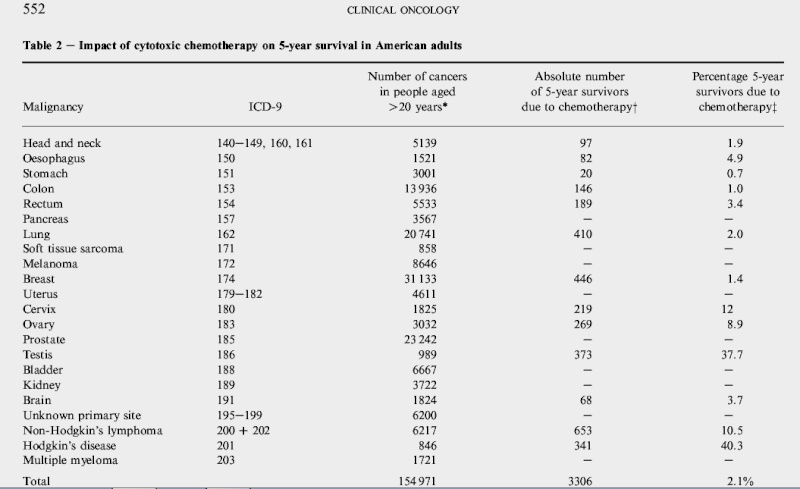http://www.icnr.com/articles/ischemotherapyeffective.html
Wherever data were uncertain, the authors deliberately erred on the side of over-estimating the benefit of chemotherapy. Even so, the study concluded that overall, chemotherapy contributes just over 2 percent to improved survival in cancer patients.
Yet despite the mounting evidence of chemotherapy's lack of effectiveness in prolonging survival, oncologists continue to present chemotherapy as a rational and promising approach to cancer treatment.
"Some practitioners still remain optimistic that cytotoxic chemotherapy will significantly improve cancer survival," the authors wrote in their introduction. "However, despite the use of new and expensive single and combination drugs to improve response rates...there has been little impact from the use of newer regimens" (Morgan 2005).
The Australian authors continued: "...in lung cancer, the median survival has increased by only 2 months [during the past 20 years, ed.] and an overall survival benefit of less than 5 percent has been achieved in the adjuvant treatment of breast, colon and head and neck cancers."
The authors point out that the similarity of the figures for Australia and the US make it very likely that the recorded benefit of 2.5 percent or less would be mirrored in other developed countries also.
Wherever data were uncertain, the authors deliberately erred on the side of over-estimating the benefit of chemotherapy. Even so, the study concluded that overall, chemotherapy contributes just over 2 percent to improved survival in cancer patients.
Yet despite the mounting evidence of chemotherapy's lack of effectiveness in prolonging survival, oncologists continue to present chemotherapy as a rational and promising approach to cancer treatment.
"Some practitioners still remain optimistic that cytotoxic chemotherapy will significantly improve cancer survival," the authors wrote in their introduction. "However, despite the use of new and expensive single and combination drugs to improve response rates...there has been little impact from the use of newer regimens" (Morgan 2005).
The Australian authors continued: "...in lung cancer, the median survival has increased by only 2 months [during the past 20 years, ed.] and an overall survival benefit of less than 5 percent has been achieved in the adjuvant treatment of breast, colon and head and neck cancers."
The authors point out that the similarity of the figures for Australia and the US make it very likely that the recorded benefit of 2.5 percent or less would be mirrored in other developed countries also.

 Home
Home
